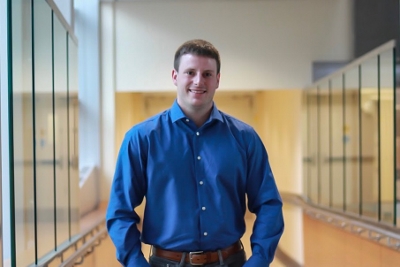
PhD student and 2018 Vanier Canada scholar Andrew Woodman.
A mother's health during pregnancy can have long-term implications for babies. It's an area of research that Department of Pharmacology PhD student Andrew Woodman believes is often overlooked, and merits further investigation.
Woodman stands out as a future leader in health science research, having already earned an impressive list of honours at the local, provincial and national levels, including a recent FoMD Med Star award. This year, he is the recipient of a Vanier Canada Graduate Scholarship, a prestigious national award that attracts and supports leading graduate research over a three-year term.
What is your research focus?
I study how complications in pregnancy affect offspring cardiovascular development and function later in life. We focus specifically on iron deficiency, which is the most common nutritional deficiency worldwide-about 25 per cent of women in Canada develop iron deficiency during pregnancy, and it can be as high as 50 percent in some regions of the world.
We study iron deficiency in pregnancy because it is so prevalent, and it has long-term health consequences for mothers and babies. My supervisor Stephane Bourque (Department of Anesthesiology and Pain Medicine and Women and Children's HealthResearchInstitute member) started this work during his own graduate studies, and I've picked up where he left off in his PhD.
My thesis focuses on how iron deficiency and anemia influence development of the fetus, and I study the long-term cardiovascular effects this has as the offspring grow into adulthood and advanced age. We're trying to understand how iron deficiency during pregnancy affects kidney development and function, which drives the high blood pressure and salt sensitivity we see in these offspring.
We've found that iron deficiency changes kidney function in adult offspring such that male offspring tend to fare much worse than their female counterparts. In a recent study we also showed that males show a greater susceptibility to adverse effects of iron deficiency even in fetal development, suggesting there's something intrinsic to males that makes them more vulnerable to these types of stressors in development.
What attracted you to this field?
Part of it was serendipity. After finishing my BSc in Calgary, I sent an email to Stephane, and about a week later, I drove up on a Saturday to meet with him and Ferrante Gragasin (who is now my co-supervisor). They gave me a tour of the lab and talked about some of the projects ongoing in the lab. I was originally planning to work on the role of anesthetics on vascular function and blood pressure regulation, which is another area of research in the lab. However, the iron deficiency research really caught my interest, and I have been working on it for the past three years now.
Four years ago I wouldn't have thought that I would be studying pregnancy complications, but this research changes my perspective on health in general. Our genes or lifestyle choices dictate a lot of health outcomes, but so much is also determined by the quality of the environment in which you develop. In fact, we now know that complications in pregnancy can influence two generations simultaneously by affecting how female fetuses' eggs develop while in utero. This means a grandmother's pregnancy conditions can have a direct impact on the health of her grandchildren.
A lot of research shows that problems like poor nutrition, maternal hypertension or gestational diabetes can impose these stressors on the fetus, which will alter its growth and development, with consequences on lifelong health. That's not recognized to the extent that it should be, and I think the developmental window represents a great opportunity for preventative medicine to reduce the risk of chronic disease later in life for many people.
What is the value of researching women's health?
Our work highlights the disparity between males and females when it comes to their responses to a pregnancy stressor. Historically, studies were almost exclusively conducted in male subjects and models, but we are increasingly recognizing the implications of having overlooked half of the population. Even at a cellular level, males and females respond differently to stimuli, meaning that if pre-clinical studies don't take this into account, the findings can't necessarily be applied to both sexes.
In addition to studying sex-differences within offspring, my research highlights the importance of optimizing health during pregnancy. Improving maternal and fetal health will ultimately allow us to reduce the burden of chronic disease on our health-care system through prevention, which is far more efficient than treating offspring once they reach adulthood and have overt cardiovascular symptoms.
Researching women's health during pregnancy is incredibly beneficial to males as well, as our results and those of many others suggest that male offspring are the ones who are most at risk in later life.
What does winning the Vanier Canada Scholarship mean to you?
I wasn't expecting to get the Vanier because it is so competitive, so it was both a surprise and an honour. I think it affirms the importance of the work we are doing, which is encouraging, and it will help me establish an independent research program later in my career. Following my PhD I plan to pursue an MD, with the ultimate goal of becoming a clinician-scientist with a translational research program, so this will help me reach that goal.
The Vanier also affirms the importance of being well-rounded, as it takes extracurricular activities into account. The more wholistic criteria allow us to pursue our passions, such as my work volunteering with the Canadian Ski Patrol locally in Edmonton and at Marmot Basin in Jasper, Alberta. Recognizing that there is more to an academic than their scholarly outputs is a step in the right direction.